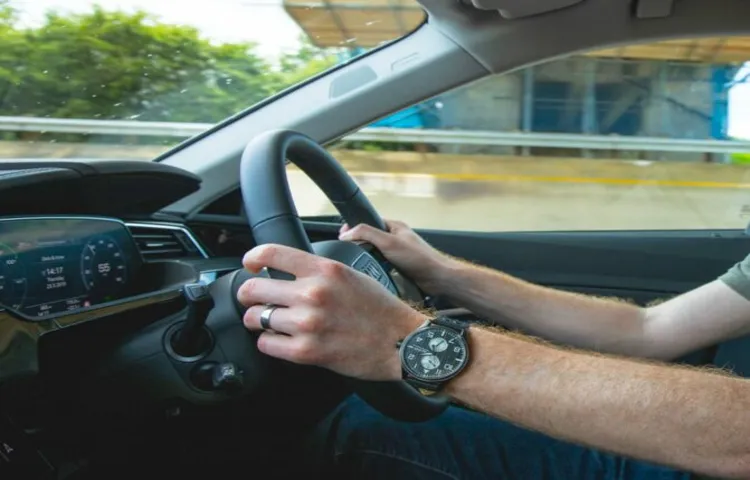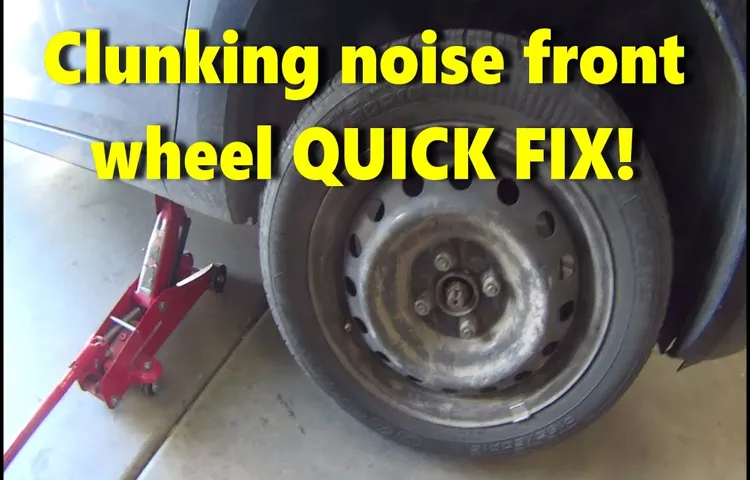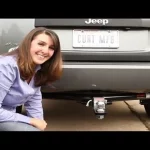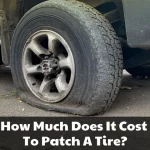Have you ever noticed an annoying clicking noise coming from your vehicle’s tires? It can be extremely irritating and distracting, especially during long drives. Not to mention, it can be quite concerning as well. You may wonder what is causing the clicking noise in your tires and if it is something serious.
Well, fear not! We are here to shed some light on this common issue and help you understand what may be causing it. In this blog post, we will delve into the various reasons why your tires may make a clicking noise while driving. So sit tight, buckle up, and let’s get started!
Table of Contents
Possible Reasons for the Noise
If you’re wondering why your tire is making a clicking noise, there could be several possible reasons. One potential cause is a problem with the wheel bearings. Over time, these can wear down or become damaged, creating a clicking sound when the tire rotates.
Another culprit could be the brake system. Worn brake pads, loose calipers, or unevenly worn brake disks can all lead to clicking noises, especially when braking or accelerating. A damaged CV joint could also be to blame, as this can create a clicking noise when turning or going around corners.
Finally, it’s possible that a foreign object has become lodged in your tire or wheel, such as a rock or piece of debris, leading to a clicking sound as it moves around. It’s worth having a professional inspect your tire and wheel system to diagnose the problem and suggest the best course of action. In the meantime, try to listen for any accompanying symptoms or changes in your vehicle’s performance to narrow down the potential causes.
Worn Out CV Joint
A worn-out CV joint can be a frustrating problem for car owners. Not only does it create loud clicking or popping noises when the car turns, but it also poses a safety hazard if left unaddressed. Fortunately, the cause of the noise can be identified by paying attention to a few key factors.
One possible reason for the noise is a lack of lubrication in the joint, which can cause the parts to rub against each other and create a clicking sound. Another possibility is damage to the boot that surrounds the joint, allowing dirt and debris to enter and cause wear and tear on the joint. Regardless of the specific cause, it’s important to have a professional diagnose and fix the problem as soon as possible to avoid further damage and ensure safe driving.
If you notice any unusual noises or vibrations while driving, don’t hesitate to have your car inspected by a trusted mechanic.

Loose Lug Nuts
One potential cause of a noise from loose lug nuts could be due to improper torque during the installation process. When lug nuts aren’t tightened to the manufacturer recommended torque specifications, they can begin to loosen over time and cause a rattling or clunking noise while driving. Additionally, regular wear and tear on the lug nuts and wheel studs can also result in loose lug nuts.
It’s important to have these checked and tightened regularly to prevent any potential safety issues while on the road. Always make sure to use a torque wrench when tightening lug nuts to ensure they are properly secured. By taking these preventative measures and checking your lug nuts regularly, you can avoid any unwanted noise and most importantly, stay safe while driving.
Damaged Wheel Bearing
A damaged wheel bearing is a fairly common issue that can cause a lot of noise and discomfort while driving. There are a number of possible reasons for this noise, including worn out bearings, lack of lubrication, and damage to the surrounding components like the hub or spindle. Some common signs of a damaged wheel bearing include a grinding or humming noise that gets louder as you drive faster, vibrations or shaking in the steering wheel or vehicle, and uneven tire wear.
If you suspect that your wheel bearing is damaged or worn out, it’s important to have it inspected by a qualified mechanic as soon as possible. Ignoring the problem can lead to more serious damage to your vehicle and potentially dangerous driving conditions. A new wheel bearing can often be installed relatively quickly and inexpensively, so it’s best to take care of the problem sooner rather than later.
Low Tire Pressure
If you hear a noise coming from your car, one of the possible reasons could be low tire pressure. When your tires are not properly inflated, they become louder and harder to handle. You may hear a buzzing sound or a thumping noise that gets louder as you drive.
Low tire pressure can cause other issues as well, such as reduced fuel economy, tire wear, and an increased risk of a blowout. It is important to regularly check your tire pressure and fill them up to the recommended level to prevent these problems. Don’t wait until you hear a noise to check your tires; take a proactive approach to ensure your safety and prolong the life of your tires.
Signs of Clicking Noise in Tires
Have you ever noticed a clicking noise coming from your tires while driving? This could be due to a few different reasons. First, it could be a small rock or piece of debris stuck in the tire tread. As you drive, the rock hits the pavement and causes a clicking sound.
Second, if your tire is low on air pressure, it could cause the tire to deform and make a clicking noise as it rolls along the road. Additionally, worn-out brake pads can cause a clicking noise as they rub against the rotor. If you’re experiencing a clicking noise in your tires, it’s important to have it checked out by a professional to ensure your safety on the road.
So, if you’re wondering why is my tire making a clicking noise, check for debris in the tire tread, ensure proper air pressure, and have your brakes inspected.
Vibrations in the Steering Wheel
If you’ve noticed a clicking noise in your tires, it may be a sign of a larger issue with your car. One common cause of this clicking noise is worn wheel bearings. As the bearings wear down, they can make a clicking or popping sound when you turn the wheel.
In addition to the noise, you may also feel vibrations in the steering wheel as you drive. Another cause of clicking in the tires can be loose lug nuts. Lug nuts are responsible for securing the tires to the hub, and if they’re loose, you may hear a clicking noise when you turn your car or go over bumps.
It’s important to address any clicking noise in your tires quickly, as it can lead to further damage or even a dangerous driving situation. If you’re unsure of the cause of the clicking, it’s best to bring your car to a trusted mechanic for an inspection.
Uneven Wear on Tires
Uneven wear on tires can be a sign of clicking noise. This problem occurs when the tires are not properly aligned or balanced. If you notice that your tires are making a clicking sound while driving, you should get them checked by a professional mechanic.
Uneven tire wear is caused by various factors such as over or under-inflation, poor wheel alignment, worn out tires, and suspension problems. If you drive on unevenly worn tires, it can be dangerous as they may not grip the road properly, leading to loss of control of the vehicle. It is important to inspect your tires regularly and keep them maintained to ensure your safety on the road.
By maintaining proper tire pressure, getting regular wheel alignments, and ensuring that your suspension is in good condition, you can avoid uneven tire wear and prevent clicking noise. Remember, your tires are the only contact point between your vehicle and the road, so it is crucial to keep them in good condition.
How to Diagnose and Fix the Issue
If you’re wondering why your tire is making a clicking noise, there could be a few different reasons why. One possible culprit could be a loose lug nut or wheel bearing. If your lug nuts aren’t tightened all the way, they can cause a clicking noise as the wheel rotates.
Similarly, a faulty wheel bearing can create a clicking noise as well. Another possibility could be a rock or debris stuck in your tire tread. As you drive, the rock or debris can make a clicking noise against the pavement.
If you can’t seem to locate the source of the clicking noise, it’s best to take your car to a mechanic for a full inspection. They can diagnose and fix the issue to prevent any further damage to your vehicle. Remember, it’s always better to address car issues sooner rather than later to keep you and your passengers safe on the road.
Inspect the Tire
When it comes to diagnosing tire issues, the first step is inspecting the tire itself. Look for any visible damage on the sidewall or tread. Check for any cuts or punctures, which could lead to a slow leak or a blowout.
Also, make sure the tire is properly inflated. An underinflated tire can cause uneven wear, reducing its lifespan and potentially leading to a blowout. On the other hand, an overinflated tire can make the vehicle harder to control, as it reduces the amount of tire in contact with the road.
If you notice any issues, it’s important to address them quickly. A simple repair may be all that’s needed to prevent further damage or a potential accident. But if the tire is beyond repair, it’s important to replace it as soon as possible to ensure the safety of both you and your passengers.
Remember, a tire is a critical component of your vehicle, and proper maintenance can go a long way in keeping you safe on the road. So next time you’re driving, take a moment to give your tires a quick inspection and address any issues that arise.
Check the Wheel Bearings
If you’ve noticed a rumbling or grinding coming from your vehicle’s wheels while driving, it’s likely that your wheel bearings need to be checked. Wheel bearings are the small, metal ball bearings that allow your wheels to spin freely. When they wear out or become damaged, the resulting noise can be alarming.
To diagnose this issue, start by jacking up your vehicle and spinning each wheel by hand. A worn-out wheel bearing will typically make grinding or rumbling sounds as you rotate it. If you suspect that your wheel bearings are the culprit, it’s important to have them replaced as soon as possible.
Not only can worn-out bearings cause damage to other parts of your vehicle, but they can also make your car unsafe to drive. Fortunately, replacing them is a relatively straightforward process that can be done by a skilled mechanic. In short, if you want to ensure your vehicle is in top working condition, checking your wheel bearings should be a part of your regular maintenance routine.
By catching and fixing any issues early on, you’ll keep your car running smoothly for years to come.
Examine the CV Joint
CV joint When it comes to diagnosing and fixing issues with a CV joint, there are a few things to keep in mind. First, be on the lookout for symptoms such as a clicking noise when making turns or vibrations during acceleration. These can be indications that the CV joint is worn out or damaged.
To confirm this, inspect the joint for any cracks or damage, and check the boots for tears or leaks. If there is damage, it’s essential to replace the entire joint rather than just repairing it. Additionally, remember that failure to fix CV joint issues can result in a breakdown, so it’s always better to address the problem as soon as possible.
By keeping an eye out for signs of wear and tear, and quickly addressing these issues, you can ensure optimal performance from your vehicle’s CV joint.
Look for Loose Lug Nuts
Keeping an eye on loose lug nuts is vital for your car’s safety. Sometimes, while driving, you may hear some sort of rattling noise that may confuse you. It’s not always very easy to spot the issue right away, so it may be prudent to take a closer look at your car before hitting the road.
If you find that your lug nuts are not tight enough, it’s important to take immediate steps to fix the issue. Loose lug nuts can cause your wheels to come off while driving, resulting in a deadly accident. If you are unsure whether your car’s lug nuts are tight enough, take the opportunity to inspect them before you drive.
Tighten any loose lug nuts with a lug wrench to the correct torque settings. If you’re not sure how to do it, seek help from a professional mechanic. Safety comes first, and taking the right precautions before driving can ensure that you’re driving on the road safely.
So, be sure to keep an eye out for loose lug nuts and avoid mishaps on the road!
Preventative Maintenance Tips
Are you experiencing a clicking noise coming from your tire? There could be a few potential reasons for this annoyance. The most common reason for a clicking noise is roughness or wear and tear of the wheel bearings, which can cause a vibration in the tire that produces the clicking sound. Another reason could be a damaged CV joint, which often makes a clicking sound when turning.
Both of these issues can be prevented with regular maintenance. It’s important to have your vehicle serviced regularly to prevent any potential issues from becoming bigger problems down the road. Checking your tire pressure, rotating your tires, and having your alignment checked can all help prevent unnecessary wear and tear on your tires and other parts of your vehicle.
Don’t let a clicking noise disrupt your driving experience, take preventative measures to ensure your vehicle stays running smoothly.
Regular Tire Inspections
Regular tire inspections are a crucial part of preventative maintenance for any vehicle. It’s always better to catch any problems with your tires early on before they result in a blowout or flat tire on the road. By checking your tires regularly, you can ensure that they are properly inflated, have enough tread, and are free of damage like cuts or punctures.
Checking your tire pressure can also improve fuel efficiency and extend the life of your tires. But how often should you check your tires? It’s recommended that you inspect your tires every month and before long trips. By making tire inspections a regular part of your routine, you can save money on costly repairs and avoid potentially dangerous situations on the road.
Don’t forget to also check your spare tire, as it can also be a lifesaver in case of an emergency. Remember, investing a little time in preventative maintenance can save you a lot of time and money in the long run.
Tightening Lug Nuts
Tightening lug nuts is an essential part of preventative maintenance for your vehicle. It ensures that the wheel stays securely attached, preventing any unfortunate accidents while driving. It’s essential to check your lug nuts regularly and tighten them if necessary.
Loose lug nuts can cause vibrations or even damage your wheel hub, leading to costly repairs. To tighten your lug nuts correctly, you’ll need a lug wrench or impact wrench. Always follow the manufacturer’s recommended torque specifications for your vehicle’s make and model to avoid over-tightening or under-tightening the nuts.
Over-tightening can cause the threads to strip, while under-tightening can lead to wheel wobbling and uneven tire wear. To make sure your lug nuts are tightened evenly, tighten them in a star pattern, rather than in a circular motion. Start with one nut, then move to the opposite nut, then the next one, and so on, until all the nuts are tight.
This method ensures that the pressure on the wheel is evenly distributed, reducing the risk of warping or bending the rim. In conclusion, tightening your lug nuts is a small, yet crucial step in maintaining your vehicle’s safety and longevity. Regularly checking and tightening your lug nuts will not only prevent accidents but also save you from expensive repairs.
Always follow the manufacturer’s recommended torque specifications and use the star pattern when tightening them. By implementing these simple steps, you’ll be well on your way to driving safely and smoothly on the road.
Proper Tire Inflation
Proper tire inflation is a crucial aspect of maintaining your vehicle’s health and performance. When your tires are not inflated correctly, it can affect everything from your fuel efficiency to your steering and handling. It’s essential to check your tire pressure regularly, at least once a month, with a tire gauge.
This process lets you know when your tires need more air or when they have too much. Overinflated tires can lead to a bumpy and uncomfortable ride, while underinflated tires can cause unsafe driving conditions that could lead to an accident. Ensuring proper tire inflation can save you money in the long run by extending the life of your tires and reducing your fuel costs.
So take the time to check your tire pressure and keep your car running smoothly.
Conclusion
In the end, the answer to why your tire is making a clicking noise might not be as straightforward as you expected. It could be due to a variety of reasons, from loose lug nuts to a stone lodged in the tire grooves. Whatever the cause may be, it’s important to address the issue promptly to avoid any potential safety hazards on the road.
But hey, at least now you have a fun new party trick – impress your friends by identifying the source of that mysterious clicking sound coming from their car tires!”
FAQs
What could be causing my tire to make a clicking noise?
There are several reasons why your tire may be making a clicking noise. It could be due to a loose lug nut, worn brake pads, or a problem with the wheel bearing.
How can I determine if my tire’s clicking noise is due to a loose lug nut?
You can check if the lug nuts are loose by using a lug wrench to tighten them. If the clicking noise goes away, then the issue was likely due to loose lug nuts.
Can worn brake pads cause a clicking noise in my tire?
Yes, worn brake pads can cause a clicking noise in your tire. The clicking noise may occur when you apply the brakes or when you release them.
Do I need to replace my tire if it’s making a clicking noise?
No, you don’t need to replace your tire if it’s making a clicking noise. However, you should have it checked by a professional mechanic to determine the underlying issue and prevent any potential safety hazards.
How long can I drive on a tire that’s making a clicking noise?
It’s not recommended to continue driving on a tire that’s making a clicking noise, as it may indicate a serious issue with the vehicle. You should have it checked by a mechanic as soon as possible.
Can a problem with the wheel bearing cause a clicking noise in my tire?
Yes, a problem with the wheel bearing can cause a clicking noise in your tire. It’s important to have it checked and repaired by a mechanic to prevent any safety hazards.
Is it safe to drive with a clicking noise coming from my tire?
It’s not recommended to drive with a clicking noise coming from your tire, as it may indicate a safety issue with the vehicle. It’s best to have it checked by a mechanic before driving again.



